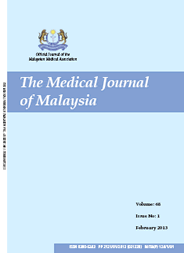MJM, Vol 70 Supplement 1 September 2015
Rural Orang Asli in Pahang: A step forward for
maternal health betterment
*Institute for Health Management, Kuala Lumpur, **Kuala Lipis District Health Office, Pahang
ABSTRACT
Introduction: Knowledge and practice of maternal health-seeking behaviour play an important role in the marginalised Orang Asli (OA) female population. Among the OA women in Negeri Sembilan (2009), the maternal mortality rate was 35.7/100,000 live births, 30% higher than the national rate. The objective of this study is to determine the knowledge and practice of maternal health-seeking behaviour among the Pahang rural OA women.
Methodology: 250 OA women (reproductive age group 15-49) from rural settlements in Pahang (Pos Sinderut and Pos Lenjang) were interviewed in this cross-sectional study using validated questionnaire. Rural settlement categorisation was based on the Jabatan Kemajuan Orang Asli guidelines.
Results: 68.8% of the respondents were knowledgeable about first antenatal check-up and were aware about the first trimester antenatal booking. 59.3% of rural respondents knew appropriate antenatal check-up frequency. 33.6% of respondents were not aware of any pregnancy-related diseases. Unsafe delivery rate was 23.4%. 81.7% of the respondents had knowledge on protein-based food like meat/chicken. However, the actual daily practice of taking meat/chicken was lower (35.7%). Only a mere 4% of the respondents consumed seafood regularly.
Conclusion: The pregnancy-related diseases awareness was poor. Expectant mothers should be educated on pregnancy-related diseases during the maternal health education sessions. Unsafe delivery rate was high. However, the causes of unsafe delivery practice were multi-factorial. Poverty contributes to lower iron-rich food consumption i.e. red meat and seafood as these items are costly in the interior/remote setting. Phase 1 study findings lead to the OA female volunteer program intervention in the phase 2. OA female volunteers’ involvement may help to create awareness on the importance of safe delivery, balanced diet and antenatal/postnatal care for the expectant mothers. This could be an effective way in introducing and enhancing long-term, sustainable community empowerment among the OA community.
Keywords: Maternal health, community empowerment, Orang Asli (native tribe)
